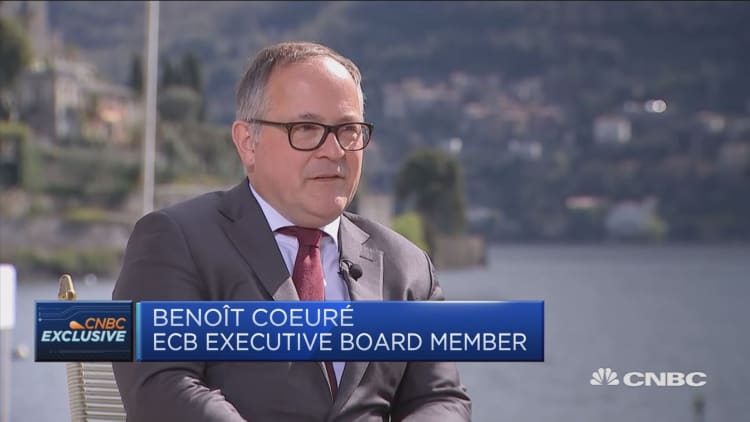
A key policymaker at the European Central Bank (ECB) believes a trade war would have "damaging" consequences for the whole world, including the U.S.
Benoit Coeure, an executive board member at the euro zone's central bank, warned that the current rhetoric on trade could escalate and provoke severe shocks in the global economy.
"If this would move into a full-fledged trade war, this has a potential to have quite damaging consequences for growth and jobs, globally, including in the U.S.," he said.
Speaking to CNBC's Steve Sedgwick on the sidelines of the European House Ambrosetti Forum in Italy Friday, he said he wasn't sure that the world was in a trade war just yet.
"As much as possible, if we could avoid the bellicose semantics and come back to a reasonable discussion that would help for economic confidence," he said.
The French economist admitted that the current exchange of words and policy decisions between the U.S. and its trade partners are already having a negative impact on the global economy.
"We've obviously seen stock prices going down, some risk premia going up, so some tightening of financial conditions globally, starting with the U.S. But it all depends on how the situation will evolve and that's certainly what we don't want to see — a general tightening of financial conditions," he said.
Coeure added that the current trade tensions are the "biggest" concern that the ECB has at the moment.
Protectionism could change monetary policy direction
Coeure's comments come as concerns rise over a trade war between the U.S. and China with both economic superpowers threatening to target each other's key exports with import tariffs.
Earlier at the European House Ambrosetti Forum, Coeure warned that changes in global tariffs would mean the baseline economic forecast for the U.S. would fall 2.5 percent. According to ECB staff simulations, world trade in goods could contract by up to 3 percent just in the first year after the change in tariffs and global growth by up to 1 percent.
"An economy imposing a tariff which is retaliated by other countries would clearly be worse off. Its living standards would fall and jobs would be lost," Coeure said in a speech.
"The effects on other economies would primarily depend on their size, trade openness and how much they trade with the tariff-imposing country," he added.
The French economist also said that higher tariffs could have implications for monetary policy and equity markets.
"The first is the effects higher tariffs would have on growth and inflation in the near to medium term … The second main implication is the possible impact on long-run potential output growth, and how that may influence the conduct of monetary policy," Coeure said.



